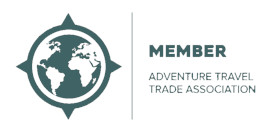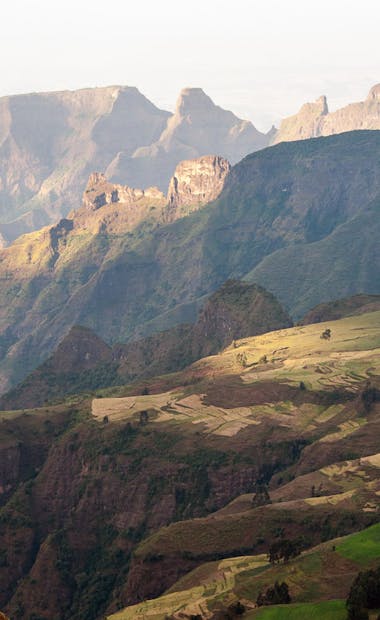
Ethiopia Tours
Tour through epic landscapes and trek the Simien Mountains in this African hidden treasure.
Ethiopia Tours
Welcome to the enchanting land of Ethiopia, where ancient traditions, breathtaking landscapes, and vibrant cultures come together to create an unforgettable travel experience. Discover the hidden gem of Africa with our remarkable Ethiopia tours and holidays. Prepare to be captivated by a country rich in history, natural wonders, and warm hospitality.
Embark on a journey to Ethiopia's magnificent attractions, where each destination unveils a tapestry of wonders. Let us take you through the highlights:
Historic Routes: Step back in time as you explore the ancient rock-hewn churches of Lalibela, a UNESCO World Heritage site. Marvel at the architectural mastery and spiritual ambiance of these monolithic structures. Trace the footsteps of emperors in Gondar, known as the "Camelot of Africa," with its majestic castles and ruins that narrate tales of a bygone era. Visit the historical city of Axum, the seat of the legendary Queen of Sheba, and discover its towering obelisks and archaeological treasures.
Simien Mountains National Park: Prepare to be awestruck by the dramatic beauty of the Simien Mountains. Trek through this UNESCO-listed national park, where jagged peaks, deep valleys, and rare wildlife abound. Encounter endemic species such as the Gelada baboon and the elusive Ethiopian wolf, while gazing upon breathtaking vistas that seem straight out of a painting.
Danakil Depression: Journey into the otherworldly landscapes of the Danakil Depression, one of the hottest and lowest places on Earth. Explore the sulfur springs, bubbling lava lakes, and colorful mineral deposits that create a surreal and unforgettable panorama. Immerse yourself in the ancient traditions of the Afar people, who have thrived in this challenging environment for centuries.
Cultural Encounters: Ethiopia's cultural diversity is as fascinating as its landscapes. Engage with the tribal communities of the Omo Valley, renowned for their distinctive customs, traditional body adornments, and vibrant festivals. Witness their tribal rituals, dances, and learn about their ancestral traditions, gaining a deeper understanding of their way of life.
Lalibela: Be transported to an ethereal realm in Lalibela, often referred to as the "New Jerusalem." Discover the rock-hewn churches carved into the earth, displaying incredible craftsmanship and religious significance. Wander through these ancient sanctuaries, observing pilgrims deep in prayer, and absorbing the spiritual aura that permeates the air.
Rift Valley Lakes: Explore the stunning Rift Valley Lakes, a series of picturesque bodies of water set amidst the rift escarpments. Lake Tana, the largest lake in Ethiopia, is dotted with historic monasteries and home to diverse bird species. Discover Lake Awasa, known for its vibrant birdlife and fishing communities, or venture to the serene Lake Langano for a relaxing lakeside retreat.
Why visit Ethiopia? Because it's a destination that stirs the soul, challenges preconceptions, and leaves an indelible mark on every traveler. From the ancient wonders to the striking landscapes, Ethiopia is a country of contrasts that will ignite your sense of adventure and ignite your curiosity.
Delve into the cradle of humanity, where history comes alive, where breathtaking scenery awaits at every turn, and where the warmth and hospitality of the Ethiopian people will embrace you. Let our Ethiopia tours and holidays unlock the door to an extraordinary journey, where you'll create lifelong memories and stories to be cherished.
Embark on an odyssey through Ethiopia with our expertly crafted itineraries, and allow the spirit of this remarkable nation to captivate your heart and ignite your wanderlust. Start your adventure today!
When is the best time to visit Ethiopia?
The best time to visit Ethiopia depends on your preferences and the regions you plan to explore. Ethiopia's climate varies due to its diverse landscapes and elevations, so it's important to consider the different seasons and weather patterns. Here's a breakdown of the seasons and the best time to visit various parts of Ethiopia:
Dry Season (October to March):
- This is generally considered the best time to visit Ethiopia, especially for outdoor activities and cultural exploration.
- The weather is generally dry, with pleasant temperatures and clear skies.
- It's an excellent time to visit the historic sites in the north, including Lalibela, Axum, and Gondar, as well as the Simien Mountains.
- The southern regions, such as the Omo Valley, are also accessible and offer opportunities to engage with local tribes.
Green Season (April to September):
- This period is known as the "green season" or the rainy season in Ethiopia.
- The landscape becomes lush and vibrant, with blooming flowers and greenery.
- The rainfall varies across different regions, with some areas experiencing heavy downpours, while others receive lighter showers.
- It can be a good time for wildlife enthusiasts, as the parks and reserves are less crowded, and the vegetation attracts animals.
- The Danakil Depression and the northern historic sites are still accessible, but road conditions in remote areas may be challenging.
Timkat Festival (January):
- If you're interested in experiencing cultural festivals, January is a fantastic time to visit Ethiopia.
- The Timkat Festival, celebrated in late January, is a vibrant and colorful event that commemorates the baptism of Jesus Christ.
- The festival is particularly significant in Lalibela and Addis Ababa, where processions, ceremonies, and traditional dances take place.
It's important to note that Ethiopia's highland regions have a relatively cool climate year-round due to their elevation, while the lowland areas can be hot and dry. It's advisable to pack layers of clothing to accommodate temperature variations.
Ultimately, the best time to visit Ethiopia depends on your interests, preferred activities, and tolerance for weather conditions. Consider the specific regions you plan to explore and consult with a travel expert or do further research to determine the ideal time for your visit.
Will I need a visa to travel to Ethiopia?
Yes, most visitors to Ethiopia will require a visa to enter the country. However, the visa requirements can vary depending on your nationality. Here are some general guidelines:
Visa on Arrival: Ethiopia offers visa on arrival for citizens of many countries. This allows you to obtain a visa upon arrival at the Bole International Airport in Addis Ababa or other designated entry points. The visa on arrival is valid for either 30 or 90 days, depending on the type of visa you apply for.
eVisa: Ethiopia also offers an electronic visa (eVisa) system, which allows you to apply for a visa online prior to your trip. The eVisa is available for citizens of eligible countries and provides a convenient way to obtain your visa in advance. You can apply for an eVisa through the official Ethiopian eVisa website.
It is important to check the official website of the Ethiopian Immigration and Nationality Affairs Office or consult with the nearest Ethiopian embassy or consulate in your country to verify the visa requirements specific to your nationality. They will provide you with the most up-to-date and accurate information regarding visa regulations, required documentation, fees, and application processes.
It's advisable to apply for your visa well in advance of your travel dates to allow for processing time. Ensure that your passport is valid for at least six months beyond your intended departure date from Ethiopia.
Remember to carry your passport with your valid visa during your stay in Ethiopia, as you may be required to present it to authorities when entering or exiting the country or during random checks.
Please note that visa requirements are subject to change, so it's essential to verify the latest information before making your travel arrangements to Ethiopia.
What are the must see destinations in Ethiopia?
Ethiopia is a land of extraordinary diversity and boasts a plethora of must-see destinations that will leave you in awe. Here are some of the top attractions and must-visit destinations in Ethiopia:
Lalibela: Known as the "New Jerusalem," Lalibela is a UNESCO World Heritage site famous for its rock-hewn churches. These remarkable structures, carved out of solid rock, showcase exquisite architecture and religious significance. The most iconic among them is the Church of St. George, shaped like a cross.
Simien Mountains National Park: A UNESCO World Heritage site, the Simien Mountains offer breathtaking landscapes and unique wildlife. Trek through the rugged terrain and be rewarded with stunning vistas, jagged peaks, deep valleys, and encounters with endemic species like the Gelada baboon and the Ethiopian wolf.
Axum: Delve into Ethiopia's ancient past in Axum, a historical city that was once the center of the Aksumite Empire. Explore its archaeological sites, including towering obelisks, ancient tombs, and the Church of St. Mary of Zion, believed to house the Ark of the Covenant.
Danakil Depression: Venture into the otherworldly landscapes of the Danakil Depression, one of the hottest places on Earth. Witness the sulfur springs, salt flats, and colorful mineral deposits, and marvel at the dramatic scenery. You can even visit the active Erta Ale volcano and witness its bubbling lava lake.
Gondar: Known as the "Camelot of Africa," Gondar is a city with a rich imperial history. Explore the Royal Enclosure, a UNESCO World Heritage site that houses magnificent castles, churches, and royal bathhouses. Don't miss the iconic Fasilides' Castle and the Debre Birhan Selassie Church, adorned with beautiful frescoes.
Omo Valley: Journey to the remote and culturally diverse Omo Valley, where you can interact with various indigenous tribes. Meet the Hamar, Karo, Mursi, and other communities known for their distinctive traditions, body adornments, and vibrant ceremonies. It's a unique opportunity to learn about their ancient customs and way of life.
Lake Tana and Blue Nile Falls: Explore the serene Lake Tana, the largest lake in Ethiopia, dotted with historic monasteries. Take a boat ride to visit some of these monastic treasures, which house ancient religious artifacts. Nearby, witness the majestic Blue Nile Falls, known as the "smoking water," with its impressive cascades and rainbows.
Bale Mountains National Park: Immerse yourself in the natural wonders of Bale Mountains National Park, home to diverse ecosystems and rare wildlife. Trek through lush forests, vast moorlands, and alpine landscapes while seeking encounters with Ethiopian wolves, mountain nyala, and endemic bird species.
These are just a few highlights of Ethiopia's incredible destinations. From ancient ruins to stunning landscapes and vibrant cultures, Ethiopia offers a wealth of experiences that will leave you with unforgettable memories. Each region has its own unique charm and attractions, making Ethiopia a truly captivating destination to explore.
What is the local currency in Ethiopia, and can I use credit cards?
The local currency in Ethiopia is the Ethiopian Birr (ETB). It is advisable to have some local currency with you for small purchases, transportation, and in areas where cash is preferred.
Credit cards are becoming more widely accepted in Ethiopia, particularly in larger hotels, restaurants, and some shops in major cities like Addis Ababa. However, it's important to note that credit card acceptance may be limited, and it's always a good idea to carry some cash as a backup.
Here are a few key points to keep in mind regarding currency and credit card usage in Ethiopia:
Cash: It's recommended to carry cash in smaller denominations, especially when traveling to remote areas or visiting local markets where credit card facilities may not be available. You can exchange foreign currency into Ethiopian Birr at banks, authorized exchange offices, or hotels. Keep in mind that it's advisable to carry newer banknotes in good condition, as older or damaged bills may not be accepted.
ATMs: ATMs are widely available in major cities and towns in Ethiopia. They accept major international debit and credit cards such as Visa and Mastercard. However, it's advisable to have a backup plan and carry enough cash in case you encounter any issues with ATMs or if you're visiting more remote areas where ATMs may be scarce.
Credit Cards: As mentioned earlier, credit cards are accepted in some hotels, upscale restaurants, and larger establishments in urban areas. However, it's important to notify your credit card company in advance about your travel plans to Ethiopia to ensure smooth transactions and to check if any additional fees may apply for international usage. It's also recommended to carry a backup card from a different provider in case of any unexpected issues.
Remote Areas: In more remote regions and smaller towns, it's advisable to have sufficient cash as credit card acceptance may be limited or unavailable. It's always a good idea to plan ahead and carry the necessary cash for your travel needs in such areas.
Remember to keep your cash and cards secure while traveling and to be cautious when using ATMs or making credit card transactions to protect against potential fraud.
It's recommended to check with your bank or credit card provider before your trip to Ethiopia to inquire about any specific requirements or restrictions related to using your cards in the country.
Is Ethiopia a good family holiday destination?
Absolutely! Ethiopia can be a fantastic destination for a family holiday. With its diverse landscapes, rich history, and vibrant cultures, Ethiopia offers a range of experiences that will captivate both children and adults alike. Here are some reasons why Ethiopia is a great family holiday destination:
Educational Opportunities: Ethiopia's long and fascinating history provides numerous educational opportunities for children. Exploring ancient rock-hewn churches, visiting historic sites, and learning about the Aksumite Empire can be engaging and enriching experiences. It's a chance for children to discover different cultures, traditions, and historical events, fostering their curiosity and knowledge.
Unique Wildlife: Ethiopia is home to diverse wildlife, some of which are endemic to the country. The Simien Mountains offer a chance to see the Gelada baboons up close, while the Bale Mountains National Park provides opportunities to spot Ethiopian wolves, mountain nyala, and other unique species. Wildlife encounters can be both educational and exciting for children, creating lasting memories.
Cultural Immersion: Ethiopia's cultural diversity is a highlight of any visit. In the Omo Valley, families can interact with indigenous tribes and learn about their customs, arts, and traditional way of life. Children can gain a deeper appreciation for different cultures and broaden their understanding of the world around them.
Outdoor Adventures: Ethiopia's stunning landscapes offer ample opportunities for outdoor adventures. From hiking in the Simien and Bale Mountains to exploring national parks and trekking to waterfalls, families can embark on thrilling and scenic escapades together. It's a chance to connect with nature, enjoy outdoor activities, and create shared experiences.
Friendly Locals: Ethiopians are known for their warm hospitality and welcoming nature. Families will likely find the local people friendly, helpful, and eager to interact with children. This can enhance the overall experience, making families feel at ease and welcomed throughout their journey.
Food Exploration: Ethiopian cuisine is flavorful and diverse, offering a range of dishes that can be enjoyed by the whole family. From injera (a traditional sourdough flatbread) to delicious stews and vegetarian options, children can explore new flavors and textures while enjoying family meals together.
It's important to plan your itinerary according to your family's interests, taking into consideration the ages of your children and their specific needs. Keep in mind that traveling in Ethiopia may require some flexibility and preparation, as infrastructure in certain areas might be more basic compared to urban centers.
Is Ethiopia a good destination for solo travellers?
Yes, Ethiopia can be an excellent destination for solo travellers. With its rich history, diverse landscapes, and vibrant cultures, Ethiopia offers unique experiences and opportunities for solo exploration. Here are some reasons why Ethiopia is a great destination for solo travellers:
Warm Hospitality: Ethiopians are known for their warm hospitality and friendly nature. As a solo traveller, you're likely to encounter welcoming locals who are eager to engage in conversations, share their culture, and offer assistance when needed. This can create a sense of comfort and ease during your solo journey.
Historical and Cultural Exploration: Ethiopia boasts a wealth of historical and cultural sites that can be fascinating to explore on your own. From the rock-hewn churches of Lalibela to the ancient ruins of Aksum and the medieval castles of Gondar, you can immerse yourself in Ethiopia's rich heritage and delve into its captivating past.
Natural Wonders and Outdoor Adventures: Ethiopia's diverse landscapes offer a range of outdoor activities and adventures for solo travellers. You can trek through the stunning Simien and Bale Mountains, visit the otherworldly Danakil Depression, or marvel at the cascading Blue Nile Falls. Exploring these natural wonders on your own allows you the freedom to set your own pace and indulge in personal reflection.
Cultural Interactions: Solo travel provides ample opportunities to engage with local communities and immerse yourself in Ethiopian culture. Whether you visit bustling markets, witness traditional ceremonies, or spend time in remote villages, solo travel allows for deeper connections and a more authentic cultural experience.
Personal Growth and Self-Discovery: Traveling solo allows you to challenge yourself, step out of your comfort zone, and gain valuable insights. It offers the freedom to make spontaneous decisions, meet like-minded travelers, and discover your own path. Ethiopia's rich cultural tapestry and diverse landscapes provide a conducive environment for personal growth and self-discovery.
As with any destination, it's important to take basic safety precautions and be mindful of your surroundings. It's advisable to research and plan your itinerary in advance, including accommodation options and transportation arrangements. Informing someone about your travel plans and staying connected through reliable communication channels can add an extra layer of security.
Ultimately, Ethiopia's welcoming atmosphere, captivating history, and breathtaking landscapes make it an ideal destination for solo travelers seeking adventure, cultural immersion, and personal exploration.
Is Ethiopia a safe destination?
Ethiopia is generally considered a safe destination for travelers. However, it's important to be aware of certain factors and take necessary precautions to ensure a safe and enjoyable trip. Here are some tips to help you stay safe while traveling in Ethiopia:
Stay Informed: Before your trip, stay updated on the current situation in Ethiopia by checking travel advisories issued by your government or reliable sources. These advisories provide information on potential risks, safety concerns, and any travel restrictions in specific regions of the country.
Research and Plan: Thoroughly research your destinations and plan your itinerary in advance. Be aware of any areas that may have security concerns or unstable conditions. It's also recommended to book accommodations and transportation with reputable providers.
Local Customs and Cultural Sensitivity: Respect the local customs, traditions, and cultural norms of Ethiopia. Dress modestly, particularly in religious sites and rural areas, and be mindful of your behavior to avoid inadvertently offending anyone.
Personal Belongings: Take precautions to safeguard your personal belongings. Keep your valuables secure, use a money belt or a secure bag, and be cautious of pickpocketing in crowded areas. It's also advisable to make copies of important documents like your passport and keep them separate from the originals.
Transportation: When using public transportation or taxis, choose reputable and licensed services. If possible, opt for pre-arranged transportation or reliable taxi companies. Exercise caution when traveling at night and be aware of your surroundings.
Health and Hygiene: Stay updated on necessary vaccinations and health precautions before traveling to Ethiopia. It's recommended to consult with a healthcare professional or a travel clinic to discuss any required vaccinations or medications based on your specific travel plans.
Communication: Stay connected with friends, family, or fellow travelers. Share your itinerary and let someone know about your plans and expected return dates. Carry a reliable means of communication, such as a mobile phone with local SIM card or international roaming, in case of emergencies.
As with any travel destination, it's important to exercise common sense, be aware of your surroundings, and trust your instincts. By taking these precautions and staying informed, you can enjoy a safe and memorable trip to Ethiopia.
Will I require any vaccinations to travel to Ethiopia?
Yes, it is highly recommended to have certain vaccinations before traveling to Ethiopia. The specific vaccinations required may depend on factors such as your medical history, current health status, and the areas you plan to visit within Ethiopia. It is always best to consult with a healthcare professional or visit a travel clinic well in advance of your trip for personalized advice. That being said, here are some common vaccinations recommended for travel to Ethiopia:
Routine Vaccinations: Ensure that you are up to date on routine vaccinations such as measles, mumps, rubella (MMR), diphtheria, pertussis, tetanus (DPT), polio, and influenza.
Hepatitis A: This vaccination is recommended as Ethiopia is a country where hepatitis A can be contracted through contaminated food or water.
Typhoid: Typhoid vaccination is advised for travelers who may consume food or drinks that could be contaminated in areas with poor sanitation and hygiene practices.
Yellow Fever: If you are traveling from or have transited through a country with risk of yellow fever transmission, a yellow fever vaccination certificate is required for entry into Ethiopia. Some areas of Ethiopia also have a risk of yellow fever transmission, so it's important to check if you are visiting those regions.
Hepatitis B: This vaccine is recommended for travelers who may have intimate contact, receive medical treatment, or engage in activities that might expose them to blood or body fluids.
Meningococcal Meningitis: Depending on the time of year and your travel plans, vaccination against meningococcal meningitis may be recommended, especially if you plan to visit the northern part of the country known as the "meningitis belt."
It is important to note that the recommendations may change, and it's advisable to consult with a healthcare professional or travel clinic to get the most up-to-date information and recommendations for vaccinations based on your specific travel plans and personal health considerations.
Additionally, make sure to adhere to other preventive measures such as practicing good hand hygiene, drinking safe water, eating properly cooked food, and using insect repellents to minimize the risk of other diseases while traveling in Ethiopia.
How does the rooming work on tours?
Small group tours in Ethiopia typically involve a set itinerary where you travel with a group of fellow travellers and a tour leader/guide. Accommodation arrangements vary depending on the specific tour you choose. Here are some common aspects of rooming arrangements on small group tours:
Shared Rooms: In order to promote camaraderie and facilitate interaction among group members, most tours arrange shared accommodation. This means you will be paired with another member of the same gender from the group to share a room. Roommates may sometimes change periodically throughout the tour.
Single Supplement: If you prefer to have your own room and privacy, you may have the option to pay a single supplement fee. This additional fee allows you to have your own room for the duration of the tour. However, please note that single supplements can vary in cost and availability.
Roommate Matching: Tour operators usually offer roommate matching services, where they try to pair you with a suitable roommate based on your preferences, such as age range. This can help ensure compatibility and a more enjoyable experience for all participants.
Rooming Preferences: When booking your small group tour, it's important to communicate your rooming preferences to the tour operator. If you have specific requirements or preferences, such as sharing with a friend or a specific roommate request, it's advisable to inform the tour operator during the booking process.
It's important to carefully read the tour details and inclusions provided by the tour operator to understand their specific rooming policies. If having your own room is a priority, make sure to inquire about the availability of single supplements and any associated costs before booking your tour.
Keep in mind that while sharing a room with a fellow traveller can be a great way to meet new people and build connections, having your own room provides more privacy and flexibility. Consider your preferences and the dynamics of the tour when deciding whether to opt for a shared room or pay for a single supplement.
Remember to communicate your needs and preferences clearly with the tour operator during the booking process to ensure a comfortable and enjoyable accommodation experience on your small group tour in Ethiopia.
What is the food like in Ethiopia?
Ethiopian cuisine is a delightful and flavorful experience, known for its unique spices, aromatic herbs, and communal dining style. Ethiopian food offers a variety of dishes that reflect the country's rich culinary heritage and cultural diversity. Here are some highlights of Ethiopian cuisine:
Injera: Injera is a staple in Ethiopian cuisine and serves as the foundation of most meals. It is a spongy, sourdough flatbread made from fermented teff flour. Injera is used as a utensil to scoop up various dishes and is a central element of Ethiopian dining culture.
Wat: Wat refers to the spicy stews or curries that are typically served with injera. These flavorful stews are made from a variety of ingredients, including lentils, chickpeas, vegetables, or meat such as beef, lamb, or chicken. They are often simmered with a blend of spices, including berbere, a traditional Ethiopian spice mixture.
Tibs: Tibs are sautéed or grilled meat dishes commonly found in Ethiopian cuisine. The meat, such as beef, lamb, or goat, is marinated with spices and served with injera or as a separate dish. Tibs can be spiced mildly or made fiery hot depending on your preference.
Kitfo: Kitfo is a traditional Ethiopian dish made from minced raw or lightly cooked beef. It is typically seasoned with spices and served with injera. Kitfo is a favorite among meat lovers and is often enjoyed with a side of cottage cheese and vegetables.
Vegetarian and Vegan Options: Ethiopia has a rich tradition of vegetarian and vegan cuisine. Many Ethiopian Orthodox Christians follow fasting periods that require abstaining from animal products, leading to the development of delicious plant-based dishes. Shiro (a chickpea or lentil stew), misir wat (spiced red lentils), and gomen (collard greens) are popular vegetarian options.
Coffee: Coffee holds great cultural significance in Ethiopia, often referred to as the birthplace of coffee. Ethiopian coffee is known for its exceptional flavor and the traditional coffee ceremony is a must-try experience. It involves roasting, grinding, and brewing coffee beans in front of guests, creating an aromatic and social gathering.
Traditional Beverages: In addition to coffee, Ethiopia offers a range of traditional beverages. Tej is a honey wine made from fermented honey and is often enjoyed as a sweet and strong drink. Tella is a traditional Ethiopian beer brewed from barley, and it is a refreshing choice for beer enthusiasts.
Ethiopian cuisine offers a rich tapestry of flavors, spices, and communal dining experiences. It's a chance to savor unique dishes, explore different textures, and appreciate the vibrant culinary traditions of Ethiopia.
Can I drink the tap water in Ethiopia?
No, it is generally not recommended to drink tap water in Ethiopia. The tap water may contain bacteria, parasites, or other contaminants that can cause illness, particularly for travelers who are not accustomed to the local water supply. To stay hydrated and avoid waterborne diseases, it is advisable to follow these precautions:
Bottled Water: Drink only bottled water that is sealed and from trusted sources. Look for reputable brands and check the seal to ensure it has not been tampered with.
Filtered or Purified Water: If you have access to a water filter or purifier, you can use it to treat tap water. This method can help remove impurities and make the water safer to drink.
Boiled Water: Boiling tap water vigorously for at least one minute can effectively kill most bacteria and parasites, making it safe for consumption. However, be sure to cool the water before drinking it.
Water Sterilization Tablets: Water sterilization tablets or other water treatment solutions can be used to purify tap water. Follow the instructions provided with the tablets or solution for proper usage.
Avoid Ice and Uncooked Foods: When dining out, it's best to avoid ice in drinks and uncooked fruits and vegetables that may have been washed with tap water. Stick to cooked foods, hot beverages, and bottled or boiled water to minimize the risk of waterborne illnesses.
Remember to also use bottled or treated water for brushing your teeth, rinsing your mouth, and washing fruits and vegetables. It's important to maintain good hygiene practices to avoid any potential health issues during your stay in Ethiopia.
If you are unsure about the quality of the water or have any concerns, it's always safer to err on the side of caution and choose bottled water or other treated options. Your health and well-being should be a priority while traveling.
Are there any cultural norms in Ethiopia I should follow?
Yes, when visiting Ethiopia, it's important to be mindful of the local cultural norms and customs to show respect and avoid unintentionally causing offense. Here are some cultural norms to keep in mind:
Greetings: Ethiopians generally greet each other with a handshake and a warm smile. When meeting someone for the first time, it's polite to use a formal greeting, such as "Selam" (hello) or "Tena yistilign" (how are you?). Ethiopians appreciate friendly interactions and may engage in small talk before getting into the main topic of conversation.
Modest Dress: Ethiopians tend to dress modestly, especially in religious or conservative areas. When visiting churches or mosques, it's important to dress respectfully, covering your shoulders, chest, and knees. Women may consider wearing longer skirts or dresses, while men can wear long pants and shirts with sleeves.
Respect for Elders: Ethiopian society places great value on respect for elders. It is customary to show deference and use appropriate language when addressing older individuals. Use titles such as "Ato" (Mr.) for men and "W/ro" (Mrs.) for women, followed by their name.
Dining Etiquette: When invited to an Ethiopian home for a meal, it is customary to wash your hands before eating. Ethiopian meals are often communal, with dishes shared from a central platter. Traditionally, Ethiopians eat with their right hand, using injera to scoop up food. Avoid using your left hand for eating or passing food, as it is considered unclean.
Religious Sensitivity: Ethiopia has a strong religious heritage, and Christianity and Islam are the predominant religions. When visiting religious sites, show respect by dressing modestly, removing your shoes when required, and following any specific guidelines or rules.
Photography Etiquette: Always seek permission before taking photographs of individuals, particularly in rural areas or of religious ceremonies. Some people may have cultural or religious reasons for not wanting their photo taken, so it's important to be respectful and sensitive to their wishes.
Left Hand Gesture: In Ethiopian culture, using the left hand to point at someone or to pass an object is considered impolite. It's best to use your right hand for such gestures.
By being aware of and respecting these cultural norms, you can enhance your interactions with Ethiopians, foster positive connections, and show appreciation for their traditions and way of life. Embracing the local customs will contribute to a more enriching and immersive experience during your visit to Ethiopia.
What should I pack for a trip to Ethiopia?
When preparing for a trip to Ethiopia, it's important to pack appropriately for the diverse landscapes, varying weather conditions, and cultural experiences you may encounter. Here are some essential items to consider packing for your trip:
Clothing: Pack lightweight and breathable clothing suitable for warm temperatures, as Ethiopia can be quite hot, especially in lowland areas. However, keep in mind that temperatures can vary depending on the region and elevation. Include comfortable walking shoes or hiking boots if you plan to explore nature reserves or undertake hiking adventures. Also, pack modest clothing for visits to religious sites.
Layering Options: Due to varying elevations, temperatures can be cooler in mountainous regions or during the evening. Pack a light jacket or sweater for layering purposes to stay warm when needed.
Rain Gear: Ethiopia has distinct wet and dry seasons. If you're traveling during the rainy season (typically June to September), consider packing a lightweight rain jacket or poncho to stay dry during sudden showers.
Sun Protection: Ethiopia experiences strong sun rays, so it's essential to pack sun protection items such as a wide-brimmed hat, sunglasses, and sunscreen with a high SPF. Additionally, consider packing insect repellent to protect against mosquitoes and other biting insects.
Travel Adapter: Ethiopia uses Type C, Type E, and Type F electrical outlets with a voltage of 220-240V. Bring a universal travel adapter to charge your electronic devices.
Medications and First Aid Kit: If you have specific medications or require certain medical supplies, make sure to pack an adequate supply for the duration of your trip. It's also advisable to carry a basic first aid kit containing essentials like band-aids, antiseptic ointment, pain relievers, and any necessary prescription medications.
Travel Documents: Ensure you have all the necessary travel documents, including your passport (valid for at least six months beyond your intended departure date), visa (if required), travel insurance, and copies of important documents stored in a separate place.
Money and Payment Options: Carry sufficient cash in small denominations, as credit cards may not be widely accepted, especially in rural areas. It's recommended to have local currency (Ethiopian Birr) for day-to-day expenses and emergencies.
Electronics and Accessories: If you plan to bring electronic devices, such as a camera, smartphone, or tablet, don't forget to pack the necessary chargers, extra batteries, memory cards, and any other accessories you may need.
Travel Guide and Language Resources: Consider bringing a travel guidebook or downloading a reliable travel app to help navigate your destination. Learning a few basic phrases in Amharic, the official language of Ethiopia, can also be helpful for communication.
Remember to pack light and prioritize essentials, as it's easier to manage and transport your luggage during your travels. Keep in mind any specific activities or destinations you plan to visit in Ethiopia, and tailor your packing list accordingly.
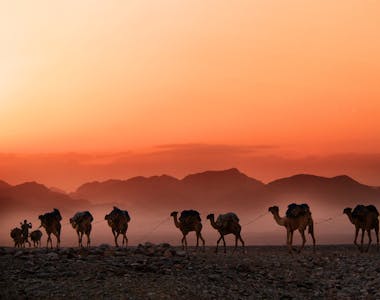
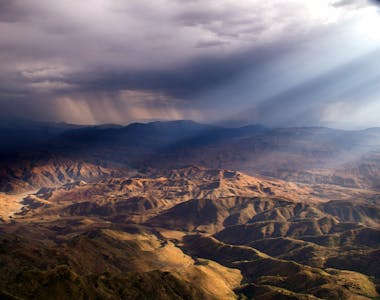
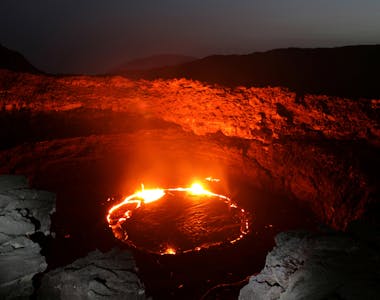
Book With Confidence
Monthly Payments
Spread the costs with no interest or additional fees
Best Price Guarantee
We won't be beaten on price. If you find this adventure at a lower price please get in touch!
Reserve now & pay later
Reserve your adventure today and pay later, free of charge
ATOL protected
Book with confidence
Hold your space today, for free
or book your trip with a deposit and then pay the rest in instalments.
Reserve your flights with us
Add flights to your booking and we'll take care of the rest. You'll get 24/7 support from our team & ATOL protection.
Speak to our experts
Call or email our expert team to find out more and help with ideas and planning.






